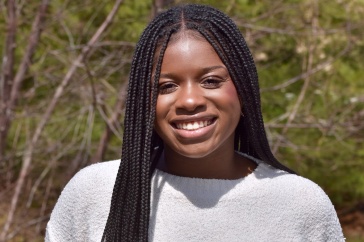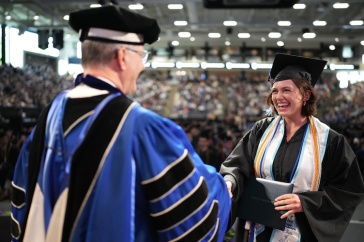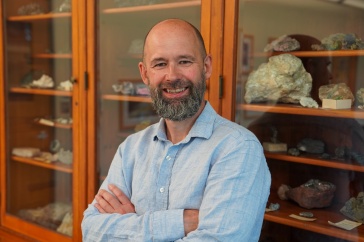Lisa Arvidson’s sons are learning what it means to never give up: She is showing them. The busy mother of two graduated from UNH this past December, two-and-a-half decades after she took her first undergraduate class at the University of Maine.
Arvidson’s parents didn’t want her to take on debt to attend the out-of-state college of her choice, so at their behest, the Eliot, Maine, resident reluctantly enrolled in UMaine’s premed program following high school.
“Early on that first year I became very rebellious and very angry,” says Arvidson, who maintained good grades through high school and was hoping to become a doctor. “At the end of my first semester, I was put on academic probation. I wasn’t an idiot; I was just in a bad mood. I didn’t go to my classes most of the time.”

At the end of her first year, the university notified her that her grades did not meet their standards for enrollment. Expelled from school at 19, Arvidson was determined to prove to her parents that if she couldn’t go to college where she wanted, she didn’t need to go to college at all.
She held a number of odd jobs before moving to Miami Beach, Florida, where she waited tables and tended bar on the iconic and fashionable Ocean Drive.
“I made great money as a bartender, but you see everything under the sun. A lot of craziness,” she recalls. “The party life wore me down very quickly. It was at that point that growing up in New England and the values of tradition, hard work and education comes back to you. I realized I wanted to go back home and go back to school.”
In 1999, Arvidson moved to Portsmouth, met the man who would become her husband and a year later began taking continuing education classes at UNH. Given her less-than-stellar record at UMaine, UNH admissions requested that she have two or three semesters of consistent good work in the continuing education program under her belt before applying as a transfer student.
But 2001 brought another event that diverted Arvidson from her degree: pregnancy and severe morning sickness, followed by the exhaustion and rigors of new motherhood. Then, when her first son was 2, she became pregnant again. This time, it wasn’t motherhood itself that was her only challenge. By the time her second child was a year old, she knew there was something wrong.
“All he did was scream, he was behind developmentally — verbal communication, everything,” Arvidson says. “I started bringing him to doctors, but they kept saying he was fine.”
Eventually, he was diagnosed with pervasive developmental disorder — not otherwise specified. He needed aggressive speech, physical, occupational and sensory therapy.
For Arvidson, returning to school became less and less a possibility when weighed against these new demands. “We were at doctors’ offices Monday through Friday,” she says. “He became my full-time job.”
Her commitment to caring for her younger son paid off, and by the time he was 8 he’d made so much progress he no longer needed the myriad supplemental therapies and was a happy and thriving second-grader.
Arvidson began to seriously consider returning to college, despite now running a small, successful photography business. “It was always hovering, and I hated knowing it was unfinished,” she says.
In 2014, she returned to UNH as a continuing education student.
“I took Bio 411 first semester because I wanted to make sure I could handle it and get back into the routine. I had to learn how to structure my time because I was a mom, I was a wife, we owned a home,” she says, “and I was still doing photography a little on the side. So learning to manage my time was the hard part. It was very, very hard.”
She also had to get over the fact that she was clearly the oldest person in the class.
“I couldn’t try to hide or blend in,” she says. “It’s pretty obvious that I’m older than traditional-age students. But there is one thing about being older: I’m not afraid to ask questions. Look, if I don’t know, I need to know. Still, when you’re in a freshman-level course, it’s definitely a humbling experience.”
In spring 2016, she applied to be an undergrad and officially enrolled as a full-time student in the biochemistry, molecular and cellular biology program that fall. It was a big moment.
Now with her newly minted bachelor’s degree, Arvidson is starting a full-time research assistant position at Cell Signaling Technology in Danvers, Massachusetts. She plans to pursue a master’s degree in biotechnology next year — perhaps at UNH. But she’s also taking the time to appreciate what she’s accomplished so far.
“Having the boys watch their mother go through this — I’ve been a student with them,” she says. “The rules that apply to them were the same that have applied to me: School first. You have to work hard, and you have to give it your best. Education is a gift. I’m really grateful I’ve been able to do this.”
Interested in pursuing a path to a bachelor's degree? Learn about the many programs available through the COLSA website.
-
Written By:
Sarah Schaier | College of Life Sciences and Agriculture
















































